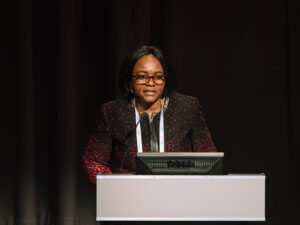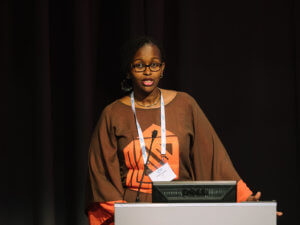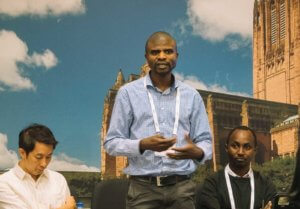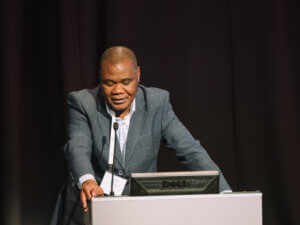At this year’s Global Symposium on Health Systems Research, iDSI collaborated with Sida and CHAI for the first time on convening a well-attended satellite session dedicated to health financing towards Universal Health Coverage (UHC) – paving the way for more collaborations in future as we explore joint work across Sub Saharan Africa to support priority-setting for UHC.
The session brought together officials from Kenya, Zambia, Indonesia, Eswatini, Rwanda and Malawi representing ministries of health, national health insurers, a Prime Minister’s cabinet and academia to share practical experiences from health financing reforms, with a focus on priority-setting and strategic purchasing.

Dr Velphi Okello: “Weak links between budgets and supply chains often a challenge”
Dr Velphi Okello, Deputy Director of Clinical Health Services at the Eswatini Ministry of Health, shared her knowledge of the design of an essential Health Benefits Package and emphasised the importance of assessing the healthcare provision landscape. Dr Okello stated assessments carried out in 10 rural clinics in Eswatini revealed they were ready to scale up the National Essential Health Care Package (EHCP). However, through assessments at clinics and hospitals, bottlenecks in the supply chain were identified and efforts were made to ensure delivery of EHCP through improvements in the supply chain through budget processes. Political attention was also found to be focusing more on tertiary care than primary care; and there was room for improvement in cross-ministerial relationships. Dr Okello raised the need to mobilise resources to make these health landscapes ready and the need to maximise efficiency opportunities as much as possible.

Dr Solange Hakiba: “Rwanda is continuing to work on educating and engaging patients and the public more to emphasise primary care is just as crucial as tertiary care”
Dr Solange Hakiba, Deputy Director General in charge of Benefits at the Rwanda Social Security Board, highlighted the importance for low and middle-income countries (LMICs) to scope out opportunities to engage the private sector. Dr Hakiba detailed how Rwanda brought the private sector on board to help build infrastructure in partnership with nurses and the District Government, who provided buildings and furniture. Dr Hakiba explained how Rwanda experienced a lack of health workforce following genocide in 1994; as the country recovered its education system this meant more university graduates were coming through, however Rwanda still required non-university educated nurses and community health workers, thus set up ‘Health Posts’ which operate as entry-level clinics in the public sector and provide care for common conditions such as malaria and diarrhoea. Each post is run by an experienced nurse given access to financing and training in business, post-operations and clinical skills. The franchise approach allows the nurse operator to earn a living operating a small business while increasing access to essential medicines and basic healthcare for communities. After a short grace period, the Health Posts begin operating on a self-sustaining basis and can accept reimbursements through Rwanda’s community-based health insurance scheme, the Mutuelle de Sante, which covers approximately 90% of the population. Rwanda is continuing to work on educating and engaging patients and the public more to emphasise that effective and efficient primary care is just as crucial as tertiary care.

Dr Gerald Manthalu: “Multiple sources of funding for health are often not used efficiently as many have different priorities and plans – pooling of funds where possible can help with challenges of fragmentation of financing”
Issues surrounding the fragmentation of financing was raised by Dr Gerald Manthalu, Deputy Director of Planning at Malawi’s Ministry of Health. Dr Manthalu explained how Malawi had over 190 different sources of funding for health, however their use was not always efficient as many had different priorities and plans in place. Dr Manthalu specified Malawi was tackling this specific challenge by aiming to carry out more detailed resource mapping; and encouraging the pooling of funds where possible, especially from donors. Dr Manthalu mentioned the importance of potential revisions of Essential Medicines Lists and also the need to make citizens more aware and encouraging nationwide discussions. The last revision of Malawi’s Essential Medicines List included the addition of antenatal corticosteroids, chlorhexidine, injectable contraceptives and contraceptive implants – increasing commodity access for women and newborns who need lifesaving interventions.
Remaining on the topic of Essential Medicines Lists, Pak Budi Hidayat, Professor of Health Economics and Health Insurance at the University of Indonesia and a member of the national Health Technology Assessment (HTA) Committee, announced at the satellite session the decision by Indonesian authorities to delist certain medicines deemed to be cost-ineffective from the national formulary. Professor Hidayat stated that Badan Penyelenggara Jaminan Sosial, the social insurance agency responsible for administering the Jaminan Kesehatan Nasional (JKN), the world’s largest single national health insurance scheme for Universal Health Coverage, will no longer reimburse cetuximab and bevacizumab for certain colorectal cancers. iDSI core partner HITAP was instrumental in the economic evaluation of the two medicines which led to the policy decision. The costs of these drugs are strikingly high with only marginal benefits for patients, so much so that they are considered poor value for money and not advised as first-line treatment options even in high-income countries.

Dr Henry Kansembe: “G2G funding can result in one strategic plan and a country’s strategic purchasing formula can be applied to a larger amount”
Chief Planner at Zambia’s Ministry of Health (MoH) Dr Henry Kansembe gave examples of how strategic thinking can improve health indicators in a space where fiscal expansion is limited. Dr Kansembe explained how Zambia’s MoH were aware they would unlikely get increased funding from their country’s treasury, so created incentives for providers to perform better. Results-based financing was on five key performance indicators and led to 30% of the allocation being invested more strategically. Zambia has also explored ‘G2G’ funding, where government funds are pooled with donor funds – meaning one strategic plan can be put together and a country’s strategic purchasing formula can be applied to a larger amount of funding.
Practicalities surrounding health financing towards UHC discussed ranged from data constraints to political challenges, such as how to engage civil society. Professor Tony Culyer highlighted the importance of the education of and understanding from all stakeholders, including the public; and used examples of where blood pressure control methods had received public ‘buy in’ after they were successfully communicated, by both health ministries/departments and the media.
Professor Kalipso Chalkidou emphasised the need for LMICs to have more access to data on costs/prices of essential medicines, as high mark-ups are often charged on medicines in LMICs. This could be due to historical practices, or a result of public services buying medicines in the private sector. Professor Chalkidou used the Congo as an example, where the cost of essential medicines is four times higher than the international average; and stressed that the impact is often on individuals, given the high percentage of out-of-pocket payments in LMICs.
The need for integration and transparency with regards to priority-setting; and ensuring policy-makers are on the same page as academics was also high on the agenda during the session. All agreed academics are habitually signed up to the process of priority-setting for decision making. Decision making however doesn’t always follow through with the priority-setting process. Being transparent when engaging with stakeholders and citing what options were and who was consulted was highlighted as the only way to defend difficult decisions. The value of having a legal and governance framework to link priority-setting and decision making was a theme that was frequently raised throughout the session.
On the topic of Health Technology Assessment (HTA) infrastructure, the UK and Sweden were hailed as success stories, as a drug is not approved for reimbursement before the HTA process (including health economic analyses) has occurred. In contrast, the HTA process happens far too infrequently in LMICs. All concurred it could be challenging to replicate the same structure the UK and Sweden has elsewhere, however a strategy to collaborate internationally – such as via universities’ economics departments – could be a promising way forward to foster HTA within LMICs.
The satellite session received funding from the Swedish International Development Cooperation Agency (Sida), working on behalf of the Swedish Parliament and Government; and was co-hosted by the Clinton Health Access Initiative, Sida and iDSI. We have made all presentations from the session available for download.
Ahead of the event iDSI caught up with Patric Landin, regional advisor for Sida’s Sexual and Reproductive Health and Rights team; and Dr Yogan Pillay, Deputy Director-General for Communicable and Non-communicable Disease, Prevention, Treatment and Rehabilitation in the National Department of Health in South Africa.
Read our 60 seconds interview with Patric Landin here.
Read our 60 seconds interview with Yogan Pillay here.
